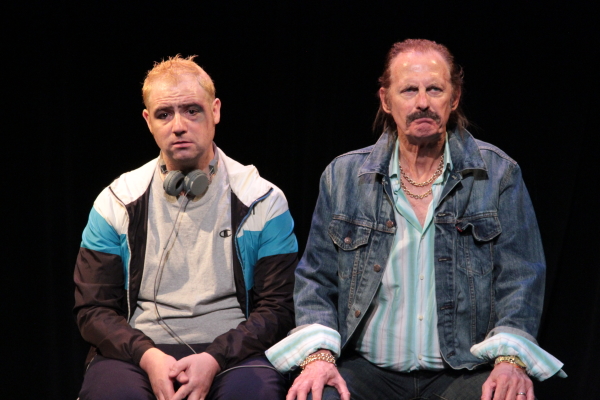The Last Days of Cleopatra
Three sad sacks and a funeral feature in this world premiere from Ireland.

(© Trevor Murphy)
We all confront death eventually, some more gracefully than others. Irish playwright Laoisa Sexton offers a tale of a family clumsily stumbling through their grief in The Last Days of Cleopatra, now making its world premiere at Urban Stages.
Harry (Kenneth Ryan) is a middle-aged man living on a fixed income in suburban Dublin. His son, Jackey (Michael Mellamphy), is a convenience store clerk. His daughter, Natalie (Sexton), dresses up as TV characters (Elmo, Barney, Dora) for children's birthday parties. Their downwardly mobile existence is thrown into a tailspin when Natalie and Jackey's mother, long suffering with a debilitating illness, suddenly dies. She was the glue holding the clan together with her unique blend of '90s dance music and showtunes. "When she walked in the room you could hear the promises breakin' all around her," Harry recalls about his first encounter with his children's mother. While we never actually meet her, we get to know that she was a lovely woman. The three survivors must decide if they will persist as a family or part ways.
Until the very end, the entire play is presented in direct address to the audience. Characters unload their feelings and observations onto us, sometimes two at a time. While their topics of conversation are often related, the characters are not speaking with each other. They're speaking to us. It feels like listening to a needy friend grumble nonstop about his problems: quite draining and more often than not, a little boring.
Our three protagonists opine on all matters of life throughout their seemingly endless venting session. "If ye bend over far enough, ye can see right up your own hole; that’s where you’ll find yourself," Natalie shares of her thoughts on yoga. There's a certain poetry about Sexton's prosaic vulgarity. While her characters share some very ugly thoughts, they have a striking way of conveying them.
All three aforementioned actors have a talent for interpreting Sexton's language, despite the considerable challenge of delivering it to a silent scene partner. Kevin Marron rounds out the cast in the triple role of Skanger/Karl/Maureen, the latter of which he hilariously portrays in drag with a cheap fur-trim coat and angry straight black haircut. Mellamphy convincingly embodies a very specific gay archetype, possessing an endless stream of judgment on the physical appearance of others despite the schlubby tracksuit that passes for his day-to-day apparel (costumes by Patricia Mustard). He also has an annoying habit of speaking in hashtags, like a walking, talking Twitter feed.
The impressive skill of the actors reinforces what seems like a waste of dramatic potential in having most of the play delivered in direct address. Indeed, once the actors actually start speaking to one another (in the car ride to the funeral), the play suddenly comes alive. Unfortunately, this is just minutes from the end.
Tim Ruddy's steady direction gives the piece the staging it calls for. Sadly, even a desperate attempt to bring the action into the audience does little to liven up this mostly dreary affair.
The one saving grace of The Last Days of Cleopatra is its language. Sexton has a gift for capturing vernacular onstage in a way that sounds simultaneously sublime and authentic. It's not that the struggles of her tragic Irish characters are particularly remarkable. Their challenges (a poor job market, a death in the family, fracturing relationships) are depressingly common across the globe in 2014. It's the way in which they speak of those challenges, however, that is stunningly beautiful.









